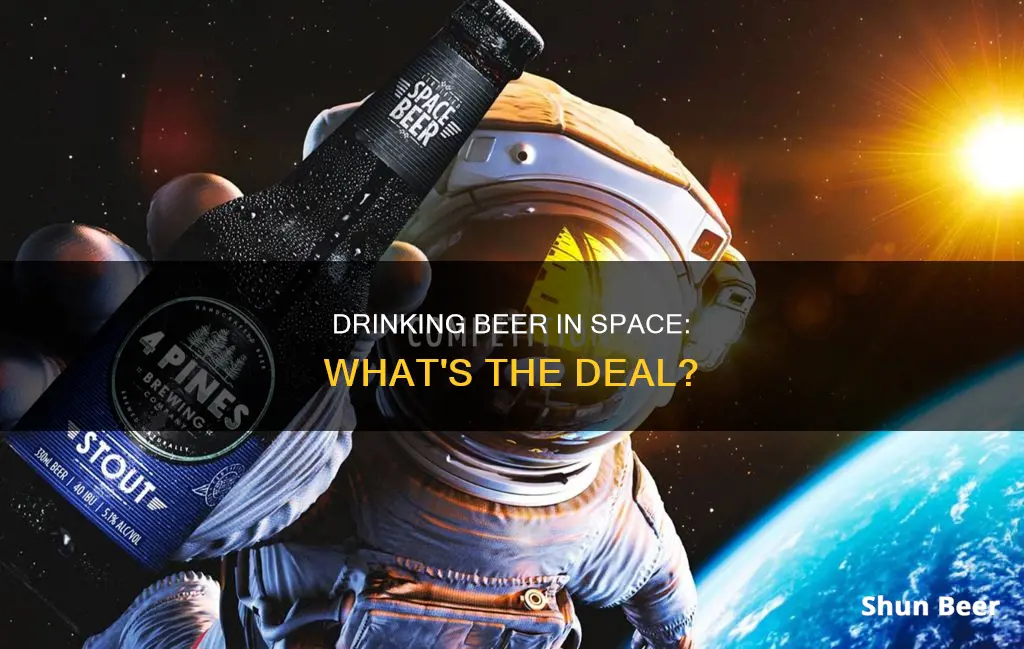
Drinking alcohol in space is a complicated topic. While it is generally not allowed, there have been instances of astronauts and cosmonauts consuming alcoholic beverages while in space or during space missions. The effects of alcohol on the human body in space are not well understood, and there are potential safety risks associated with drinking in space. Additionally, carbonated drinks like beer are particularly unsuitable for space due to the absence of gravity, which affects the drink's carbonation and can cause wet burps. Despite these challenges, some companies are experimenting with brewing beer and improving alcoholic beverages specifically for consumption in space.
| Characteristics | Values |
|---|---|
| Beer in space | Beer and other carbonated drinks are not suitable for consumption in space due to the absence of gravity. The bubbles cause 'wet burps' and the drink becomes flat. |
| Alcohol in space | Alcohol is generally disallowed in space due to safety concerns and the potential damage it can cause to equipment, particularly the water recovery system. However, there have been instances of astronauts and cosmonauts consuming alcohol in space, and experiments involving alcohol are conducted. |
| Drinking culture in space | There are cultural and religious considerations regarding alcohol consumption in space, with some astronauts and cosmonauts choosing to consume alcohol secretly or during special occasions. |
| Health and safety concerns | Alcohol is a depressant and can impair an astronaut's judgment and reflexes, posing risks in emergency situations. Additionally, alcohol is a fire hazard in the oxygen-rich environment of spacecraft. |
| Social and psychological impacts | Alcohol may have social and psychological effects on astronauts, potentially impacting their performance and well-being during space missions. |
| Future prospects | With potential future missions to Mars, there are ongoing discussions about relaxing restrictions on alcohol consumption for long-duration space travel. |
What You'll Learn
- Beer and other carbonated drinks are unsuitable for space due to their carbonation causing 'wet burps' and an inability to form a foamy head
- Alcohol is prohibited on the International Space Station due to its potential impact on the Environmental Control and Life Support System
- Astronauts are banned from drinking alcohol at work, but some have smuggled it onto spacecraft for decades
- Alcohol is a fire hazard in space, and there is no atmosphere to help put out any flames
- The effects of alcohol on human physiology in microgravity are unknown, but NASA expects it to differ from on Earth

Beer and other carbonated drinks are unsuitable for space due to their carbonation causing 'wet burps' and an inability to form a foamy head
Beer and other carbonated drinks are unsuitable for space due to their carbonation. In a weightless environment, bubbles of carbon dioxide are not buoyant, so they remain randomly distributed in the fluid, resulting in a foamy mess. This means that a foamy head cannot form as the bubbles do not rise.
The absence of gravity also means that the carbon dioxide bubbles go through an astronaut's digestive system, causing wet burps and potentially adverse side effects. While it is unclear what these side effects are, one theory is that an astronaut would essentially vomit every time they belch.
The issue of carbonation has been a topic of discussion for NASA, with one article on their website stating that even if a microgravity dispenser is perfected, there is no guarantee that carbonated beverages will be used in space. The article highlights the potential adverse effects of carbonation on an astronaut's body as the main concern.
In addition to the challenges posed by carbonation, beer and other alcoholic beverages are generally disallowed in spaceflight due to safety concerns and the potential impact on equipment. NASA, in particular, has strict rules prohibiting alcohol onboard the International Space Station because of its potential effects on the water recovery system.
The consumption of alcohol by astronauts has been a topic of debate and controversy, with some arguing for its potential social benefits, while others raise concerns about the potential impact on performance and coordination. While there have been some experiments and incidents of alcohol consumption in space, it remains largely prohibited by space agencies.
Beer Drinking in California Public Parks: What's Allowed?
You may want to see also

Alcohol is prohibited on the International Space Station due to its potential impact on the Environmental Control and Life Support System
Alcohol is prohibited on the International Space Station (ISS) due to its potential impact on the Environmental Control and Life Support System (ECLSS). The ECLSS is responsible for providing a livable environment for astronauts on the ISS, and alcohol can negatively affect its functioning.
The ISS is a closed system, meaning that resources like water need to be carefully managed and recycled. The ECLSS plays a critical role in this process by collecting, purifying, and distributing water for various purposes, including drinking, food preparation, and hygiene. Alcohol, being a volatile compound, can interfere with the ECLSS's water recovery processes. Its chemical volatility, or tendency to vaporize, can introduce contaminants into the water supply, compromising its quality and safety.
Additionally, alcohol-based products, such as mouthwash, perfume, and aftershave, are also prohibited on the ISS for the same reason. These products contain chemicals like ethanol, which can have similar adverse effects on the ECLSS. The ban on these products ensures that the water recovery system remains unaffected and can continue to support the health and well-being of the astronauts.
The prohibition of alcohol on the ISS is a safety measure to protect both the astronauts and the integrity of the space station's systems. It is crucial to maintain the proper functioning of the ECLSS to provide a safe and healthy environment for the crew during their missions.
Furthermore, the consumption of alcohol in space presents additional challenges and risks. The effects of alcohol on the human body in a microgravity environment are not yet fully understood. Alcohol is known to impact the immune system and hand-eye coordination, and these effects may be heightened in space. Additionally, the lack of gravity can cause liquid and gases to mix in an astronaut's stomach, leading to uncomfortable and potentially dangerous side effects, such as soggy burps or vomiting.
In conclusion, the prohibition of alcohol on the International Space Station is a necessary precaution to safeguard the Environmental Control and Life Support System and the overall well-being of astronauts during their missions in space.
Exploring Italy's Drinking Culture: Beer and Minors
You may want to see also

Astronauts are banned from drinking alcohol at work, but some have smuggled it onto spacecraft for decades
Astronauts are banned from drinking alcohol while at work, but that hasn't stopped some from sneaking alcoholic drinks onto spacecraft for decades. The ban is in place because alcohol can damage equipment and pose a safety risk. However, the relationship between alcohol and space exploration is complex, and there have been instances of astronauts consuming alcohol in space, as well as experiments involving alcohol.
NASA and other space agencies have prohibited alcohol in space due to concerns about potential damage to equipment. Alcohol contains chemicals like ethanol that can harm the International Space Station's (ISS) water recovery system and other sensitive components. The potential for spills and equipment damage during drunken antics is also a concern. In addition, astronauts are prohibited from drinking alcohol within 12 hours of launch, as they need to be fully alert and aware during that time.
Despite these restrictions, astronauts have found creative ways to smuggle alcohol onto spacecraft. For example, Russian cosmonauts have hidden bottles in their spacesuits or hollowed-out books. In 1971, a cosmonaut's friends hid a bottle of Armenian cognac in his wristband before he launched to the Salyut-7 space station. In another instance, Igor Volk, a cosmonaut, lost weight before a launch so he could fit pickled cucumbers and a bottle of cognac in his spacesuit without exceeding weight limits.
The history of alcohol in space is intriguing, with the first liquid consumed on the moon being wine during a secret communion service performed by Buzz Aldrin in 1969. NASA kept this quiet due to a lawsuit from an atheist trying to prevent religious practices in space. While NASA has strict rules on alcohol, Russian cosmonauts on the Mir space station were allowed small amounts of cognac, vodka, and "ginseng liqueur," leading to grumbles when they learned the ISS would be dry.
In addition to these instances of alcohol consumption, there have also been experiments involving alcohol in space. In 2015, a Japanese brewer sent whisky to the ISS to study how microgravity affects its flavour. NASA has also sponsored experiments on how microgravity impacts the aging process of whisky and the charred oak used in it. While astronauts are banned from drinking beer due to the carbonation issues and potential adverse effects on their digestive system, a beer company sponsored research to explore brewing beer in space.
Beer and TURP Surgery: What You Need to Know
You may want to see also

Alcohol is a fire hazard in space, and there is no atmosphere to help put out any flames
Alcohol is a fire hazard in space, and given the absence of an atmosphere, it would be challenging to extinguish any flames. This is a significant concern, as fire in the absence of gravity can have catastrophic consequences. The highly flammable nature of alcohol poses a severe risk to the safety of astronauts and the integrity of the spacecraft.
Alcohol, with its volatile nature, poses a significant fire risk in the confined and controlled environment of a spacecraft. In the absence of an atmosphere, fire can spread rapidly and uncontrollably. The unique environment of space, with its lack of gravity, further complicates the matter. Fire behaves differently in microgravity, and the flames can spread in all directions, making it extremely challenging to control and extinguish.
The potential consequences of an alcohol-related fire in space are dire. The fire could quickly engulf the spacecraft, compromising its structural integrity and vital systems. The safety of the astronauts would be at serious risk, and the potential loss of life would be devastating. Therefore, it is crucial to implement stringent measures to prevent any possibility of an alcohol-induced fire.
To mitigate the risk, strict protocols are in place to prohibit the consumption and presence of alcohol in spacecraft. These regulations are essential to ensure the safety of astronauts and the success of space missions. The protocols include restrictions on alcoholic beverages, as well as any products containing alcohol, such as aftershave or mouthwash. By enforcing these rules, space agencies aim to eliminate the fire hazard posed by alcohol and protect both human life and the significant investment in space exploration.
While the consumption of alcohol in space may seem like a minor indulgence, the potential consequences of a fire highlight the importance of adhering to these safety protocols. The unique challenges of the space environment, including the absence of an atmosphere and the presence of microgravity, further emphasize the necessity of stringent fire prevention measures. By prioritizing safety, space agencies can minimize the risk of alcohol-related fires and ensure the overall success of their missions.
Drinking Beer and Driving: What's the Legal Limit?
You may want to see also

The effects of alcohol on human physiology in microgravity are unknown, but NASA expects it to differ from on Earth
Alcohol is generally prohibited in space due to its potential impact on the Environmental Control and Life Support System (ECLSS). However, NASA and other space agencies have occasionally allowed its consumption. The effects of alcohol on the human body in microgravity are unknown, but it is expected to differ from its effects on Earth.
NASA has historically been stricter about alcohol consumption than Roscosmos, with astronauts and cosmonauts restricted from being intoxicated at launch. Despite these restrictions, there have been instances of astronauts and cosmonauts consuming alcohol in space, and experiments in making and storing alcoholic drinks in space have been conducted.
The primary concern with alcohol consumption in space is the potential impact on the human body. In microgravity, the carbon dioxide bubbles in carbonated beverages can cause "wet burps" and may have other adverse side effects. Additionally, the absence of gravity could cause the liquid and air to mix, forming froth. While the specific side effects are unclear, they could include stomach aches, unusual burps, or even vomiting.
Furthermore, alcohol is a fire hazard in space due to the lack of atmosphere, and it can impair an astronaut's judgment and reflexes, posing risks in emergency situations. Alcohol is also prohibited aboard the International Space Station due to its potential negative effects on the water recovery system, which draws water from various sources, including cabin condensation.
While there is limited research on alcohol consumption in space, studies on high-altitude drinking on Earth provide some insights. In a 1988 study, male subjects who consumed vodka at a simulated 12,500-foot elevation experienced impaired performance on various tasks, with older subjects performing worse than younger ones. However, there was no significant difference between drinkers at high altitude and those at sea level.
Drinking Beer After Donating Blood: What You Need to Know
You may want to see also
Frequently asked questions
No, beer and other carbonated drinks are not suitable for consumption in space.
In space, bubbles of carbon dioxide are not buoyant and so they remain randomly distributed in the fluid, resulting in a foamy mess.
Carbonated drinks could cause adverse side effects in a person's body. While it is unclear what these side effects are, one theory is that an individual would essentially vomit every time they belch.
Wine, whisky, cognac, vodka, and ginseng liqueur have all been consumed in space.
Alcohol is a depressant that can impair an astronaut's judgment and reflexes, which could be dangerous in an emergency. Additionally, alcohol can damage equipment and pose a fire hazard.







